Right now, right here, while you are engaged in the endless rabbit hole of the internet trying to search for what a software engineer is, you are actually experiencing the result of the brilliant work of one. So every online scroll you make is all because of these techies behind the screen for building systems, designing interactable user interfaces, complex coding algorithms, and whatnot.
This is the reason why these everyday tech heroes are so hyped. If you want your business to score well, you need to have a software engineer by your side but with the right skill set.
However, software engineering is a broad spectrum, and not every software engineer may be an expert in every nook. Some may have technical expertise in building computer information systems while some may have the skill set for maintaining network security for web pages.
Hence the reason for our topic of discussion. Our article covers what software engineers are, their job descriptions, types, and current salary. By the end of this value-packed read, you will have the right information to know what software engineering skills your company requires and how to take on that challenge.
What Is A Software Engineer?
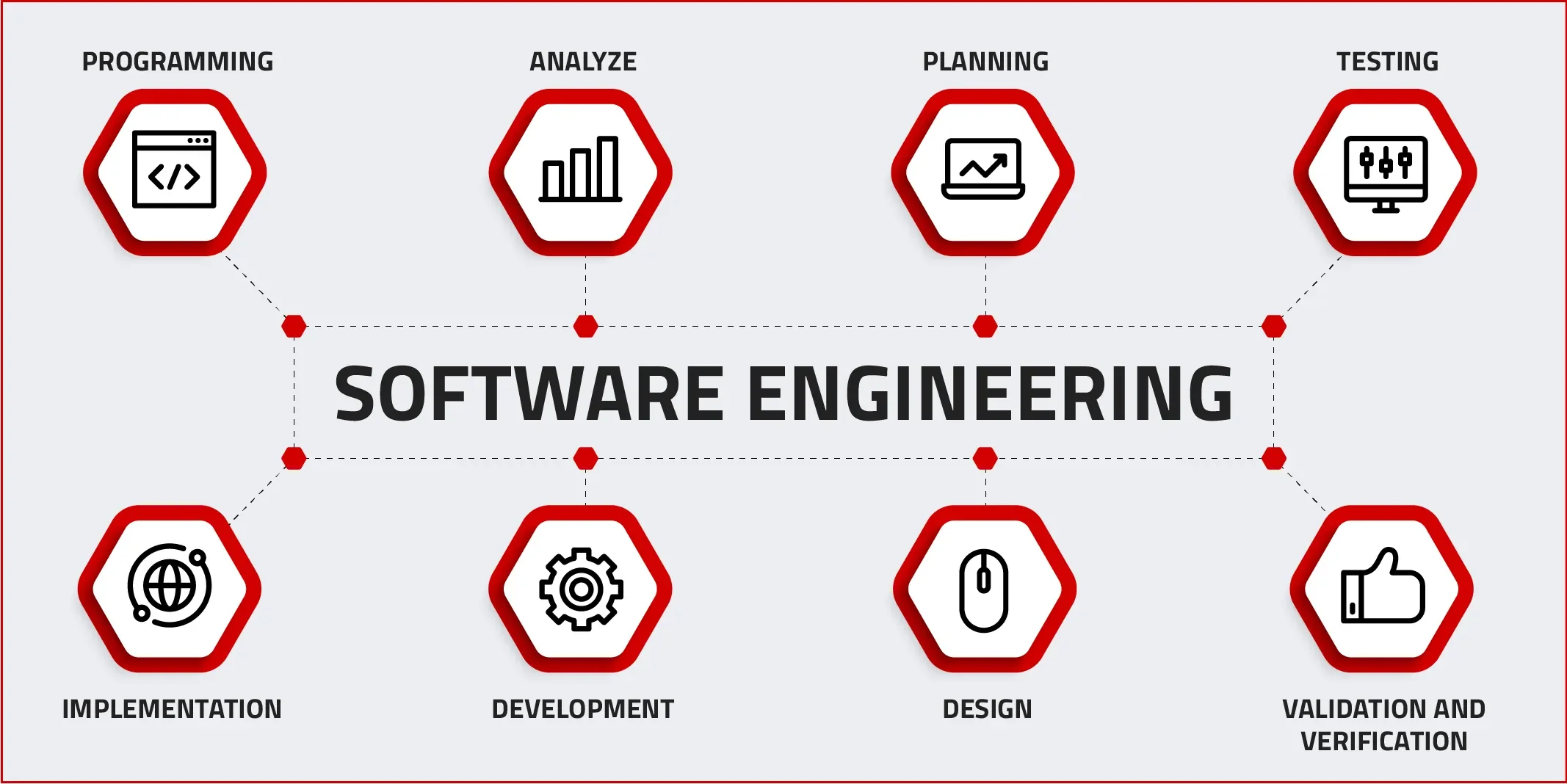
A software engineer is a professional who works on developing, designing, and maintaining software applications and systems. These software engineering professionals use their knowledge and expertise in computer science, programming languages, tools, and frameworks to create software.
Computer software engineers handle everything from planning how the program will work, testing to make sure it's working correctly, and releasing it to the end users. They also use their skills to identify issues with the program and come up with solutions.
Job Description Of A Software Engineer: Demystifying The Role
Here is a more optimized approach toward the job description of a software engineer – the key duties and responsibilities for your company.
I. Developing Software Applications
- Developing new software features and functionalities
- Designing and implementing software applications from scratch
- Collaborating with other developers and stakeholders to ensure the software is developed according to requirements
II. Testing & Debugging Software
- Analyzing and troubleshooting technical issues
- Writing and executing test plans to identify and fix software bugs
- Ensuring software is tested and debugged to meet quality standards
III. Maintaining Software Systems
- Updating and maintaining existing software systems
- Ensuring software systems remain secure and up-to-date
- Responding to technical issues and providing ongoing support for software systems
IV. Writing Technical Documentation
- Ensuring documentation is up-to-date and comprehensive
- Creating and maintaining technical documentation for software applications
- Providing documentation to other team members and stakeholders as needed
V. Modifying & Updating Software Applications
- Making modifications to existing software applications
- Updating software applications to meet changing business or customer requirements
- Ensuring modifications and updates are made according to software engineering principles
VI. Collaborating With Other Team Members
- Communicating effectively with other team members
- Ensuring software is developed collaboratively and meets all requirements
- Working with other software developers, designers, project managers, and stakeholders
VII. Staying Up-To-Date With Emerging Technologies
- Staying current with software engineering principles and best practices
- Continuously learning about new technologies and software development tools
- Ensuring software applications are developed using the latest technologies and techniques
VIII. Adhering To Industry Standards & Regulations
- Adhering to security and data privacy regulations
- Ensuring software applications are developed ethically and responsibly
- Ensuring software applications meet industry standards and regulations
We’re just scratching the surface when we discuss the responsibilities of a software engineer, so let’s take a more detailed look at different software engineer types and their duties.
8 Types Of Software Engineers: Understanding Their Roles & Responsibilities
We have already covered that software engineering is a wide perspective and every software engineer has different roles and responsibilities based on the complexity of the application. Read further to get a far-reaching outlook on different types of professional software engineers.
1. Full-Stack Software Engineer
Full-stack software engineers have a wide range of skills and can work on the parts of the program that you see and use i.e. front-end as well as the parts you don't see i.e. back-end – hence the name. They are responsible for developing complete software solutions, from the user interface to the server-side components.
The required skills in a full-stack engineer include:
- Solid understanding of database design and management
- Experience with both front-end and back-end development
- Deep understanding of programming languages, frameworks, and tools
- Well-versed in operating systems, software systems, and engineering principles
- Knowledge to create software applications that meet the needs of users and businesses
- Strong foundation in computer science, programming languages, and web development technologies
The major job responsibilities of a full-stack software engineer are:
- Developing server-side components
- Designing and implementing the user interface
- Integrating these components into a cohesive software solution
- Testing and debugging the software to ensure that it is functioning properly
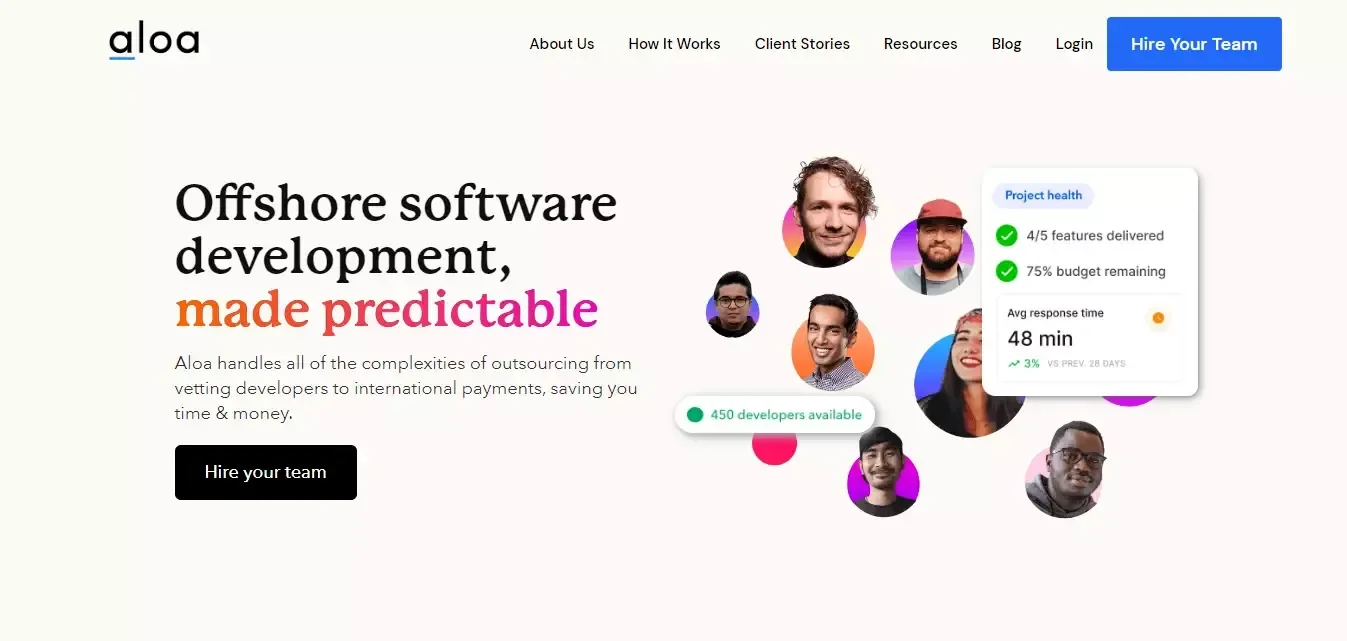
Aloa is the perfect destination for companies looking to hire highly skilled full-stack software engineers. Our strict hiring process is designed to ensure that we only hire the most qualified and experienced engineers. Our engineers are put through multiple rounds of interviews, skill assessments, and test projects. As a result, less than 1% of the candidates make it through.
At Aloa, our engineers are trained in engineering best practices to ensure that they deliver optimal results. We provide regular training and development to keep their skills sharp and relevant.
Whether you need a full-stack engineer to build a new web application, integrate with existing systems, or provide ongoing support and maintenance, our team has the skills and experience to deliver exceptional results.
2. Front-End Software Engineer
Front-end software engineers are the force behind the intuitive and visually appealing user interface that the software application has. They are concerned with designing and developing the front-end or client-side of the software application. This includes designing and implementing the user interface and user experience, creating web pages, and developing a responsive design.
Here’s a list of skills required in a front-end software engineer:
- Proficiency in HTML, CSS, and JavaScript
- Experience with version control tools like Git
- Understanding of responsive design principles
- Familiarity with design tools like Sketch or Figma
- Knowledge of web accessibility guidelines and best practices
- Knowledge of popular front-end frameworks like React, Vue, or Angular
- Understanding of cross-browser compatibility and web performance optimization
A front-end software engineer’s job duties include:
- Ensure that the website or application is optimized for maximum speed and scalability
- Ensure web accessibility for users with disabilities and comply with web accessibility guidelines
- Continuously improve user experience by incorporating user feedback and analyzing user behavior
- Work with designers to implement and maintain design systems, style guides, and pattern libraries
- Collaborate with designers and back-end developers to translate UI/UX design wireframes into functional web pages or applications
- Ensure cross-browser compatibility and implement responsive design principles to make the website or application work on different devices and screen sizes
3. Back-End Software Engineer
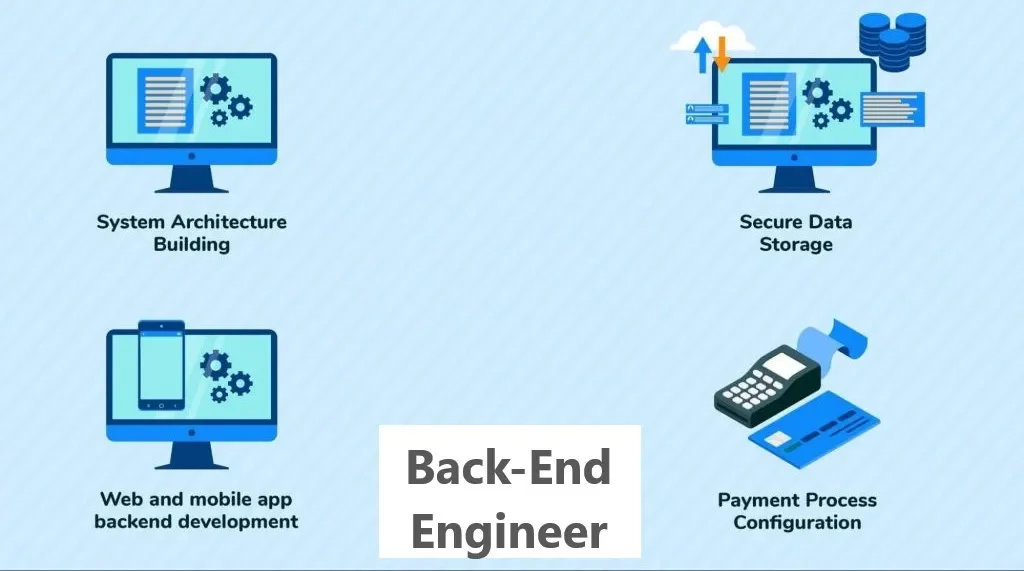
Back-end software engineers work on the "behind the scenes" infrastructure of software systems, which includes the database, API, and logic. They use different programming languages to create the server-side components of software applications. Below are the skills that back-end software engineers must possess:
- Familiarity with data modeling and database design
- Experience with database technologies such as SQL, MongoDB, or Redis
- Familiarity with serverless computing and cloud platforms such as AWS or Azure
- Proficiency in server-side programming languages such as Java, Python, or Ruby
- Understanding of caching techniques and their application in improving software performance
- Understanding of web application architecture, including server-side rendering, microservices, and API development
Some of the major responsibilities of a back-end software engineer are:
- Design and develop server-side applications, APIs, and data storage solutions
- Configure and maintain web servers, databases, and other server-side infrastructure
- Implement data security and protection measures to ensure the confidentiality of sensitive information
- Optimize database performance by fine-tuning SQL queries, indexing strategies, and query optimization techniques
- Collaborate with a front-end software developer and other team members to ensure seamless integration of the front-end and back-end
- Ensure software scalability and performance by implementing efficient code, caching mechanisms, and load-balancing techniques
4. Embedded Software Engineer

Embedded software engineers specialize in developing software for devices that are not typically considered computers but have software components. These devices can range from small microcontrollers to larger processors used in electronics and machinery. They work on developing software that is specifically designed to run on these devices and to interface with their hardware components.
When hiring an embedded software engineer, look for these technical skills:
- Proficiency in C/C++ programming languages for embedded systems
- Familiarity with communication protocols such as I2C, SPI, UART, and Ethernet
- Understanding of embedded hardware design principles and schematic reading skills
- Understanding of microcontroller and microprocessor architecture and their peripherals
- Knowledge of wireless communication technologies such as Wi-Fi, Bluetooth, and ZigBee
- Knowledge of real-time operating systems (RTOS) and their application in embedded systems
- Experience with software development tools and debugging techniques for embedded systems such as JTAG, GDB, or Oscilloscopes
Embedded software engineers perform the following duties:
- Develop software drivers for peripherals and sensors used in embedded systems
- Work with hardware engineers to define and develop system specifications and requirements
- Design and develop software for embedded systems that control the operation of hardware devices
- Conduct software integration and system testing to ensure the embedded system operates as intended
- Design and implement communication protocols for embedded systems to communicate with other devices or networks
- Test and debug software for embedded systems using specialized tools such as emulators, debuggers, and oscilloscopes
5. DevOps Engineer
DevOps engineers focus on the software development lifecycle and work on the continuous integration and delivery of software applications. They collaborate with other software engineers, quality assurance engineers, and systems software developers to ensure that software applications are functioning correctly, meeting the needs of end-users, and are delivered efficiently.
Let’s take a look at some must-have skills for a DevOps engineer:
- Experience with containerization technologies such as Docker and Kubernetes, and container orchestration
- Understanding of CI/CD principles and practices and experience with related tools such as Jenkins, GitLab, or CircleCI
- Knowledge of configuration management tools such as Ansible, Puppet, or Chef for automating system configuration
- Understanding of networking concepts such as TCP/IP, DNS, and HTTP, and their application in managing distributed systems
- Proficiency in programming languages such as Python, Ruby, or Shell scripting for automation and building infrastructure as code
- Experience with monitoring and logging tools such as Prometheus, Grafana, and ELK stack to ensure system availability, reliability, and performance
A typical job description of DevOps engineer will look like this:
- Manage and maintain cloud infrastructure, including virtual machines, containers, and networking resources
- Implement and maintain security controls and compliance requirements for the software systems and infrastructure
- Monitor system performance and troubleshoot issues to ensure system availability, reliability, and performance
- Design and implement disaster recovery and business continuity plans to ensure system availability in case of a disaster
- Continuously improve system scalability, reliability, and performance by implementing best practices and adopting new technologies and tools
- Automate infrastructure deployment, configuration management, and software release processes using industry-standard tools and best practices
6. Data Engineer
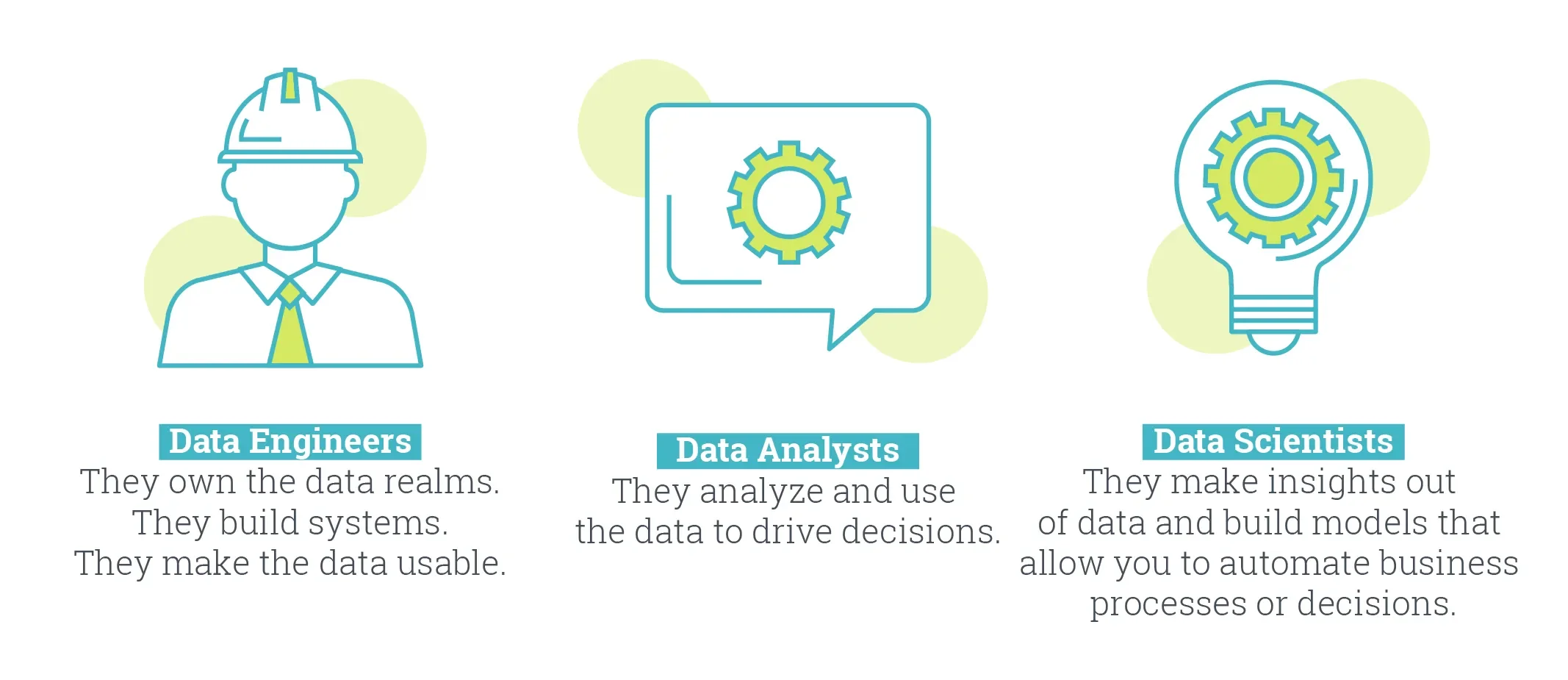
Data Engineers design, develop, and maintain the infrastructure required for the storage, processing, and analysis of large volumes of data. They are responsible for building and maintaining data pipelines that extract, transform, and load data from various sources into data warehouses or other storage solutions. A data engineer must have these skills:
- Expertise in data modeling and designing scalable and efficient database schemas
- Familiarity with distributed systems and big data technologies such as Hadoop, Spark, and Kafka
- Experience with ETL (extract, transform, load) and ELT (extract, load, transform) processes and tools such as Apache NiFi, Apache Airflow, or AWS Glue
- Knowledge of data warehousing concepts and experience with building data warehouses using tools such as Amazon Redshift, Google BigQuery, or Snowflake
- Understanding of data governance and security principles and experience with implementing data security and compliance measures such as encryption, access control, and audit logging
The primary responsibilities of data engineers include:
- Optimize data processing and storage performance by tuning queries, indexing strategies, and database configurations
- Develop and maintain data models and database schemas that support data integration, analytics, and reporting needs
- Implement data quality checks and data validation processes to ensure that the data is accurate, complete, and consistent
- Ensure data security and compliance by implementing data governance policies, access controls, and data protection measures
- Collaborate with Data Scientists, Analysts, and other stakeholders to understand data requirements and provide data solutions that meet business needs
- Design, build, and maintain scalable and reliable data pipelines that extract, transform, and load data from various sources into data warehouses or other storage solutions
7. Software Architect
Software architects are responsible for designing the overall structure of software applications. They identify software system requirements and create software architecture blueprints that guide software development. They identify potential risks and issues and work to address them early in the development process, reducing the likelihood of delays or cost overruns.
Look for these skills in software architects when hiring one:
- Expertise in software development methodologies such as Agile, Scrum, or Waterfall
- Proficiency in software design patterns and software architecture principles such as SOLID, DRY, and KISS
- Familiarity with containerization technologies such as Docker and container orchestration platforms such as Kubernetes
- Understanding of software testing and quality assurance methodologies, and experience with designing and implementing automated testing frameworks and tools
- Knowledge of cloud computing platforms such as AWS, Azure, or Google Cloud, and experience with designing and deploying cloud-based software solutions
- Experience with software integration and enterprise application integration (EAI) using tools such as API gateways, message queues, and microservices architectures
A software architect job requires them to perform these duties:
- Review code and software designs to ensure that they adhere to established architectural principles and design patterns
- Identify and mitigate technical risks and issues that may impact the quality, scalability, or maintainability of software systems
- Lead and mentor development teams, providing technical guidance and expertise throughout the software development lifecycle
- Research emerging technologies and software development practices, and make recommendations for their adoption to improve software development efficiency and quality
- Create software architecture and design specifications, including technical documentation and diagrams, that outline the structure and behavior of software systems
- Collaborate with DevOps and infrastructure teams to design and implement deployment pipelines, monitoring, and logging solutions that ensure the reliability and availability of software systems
8. Cloud Architect
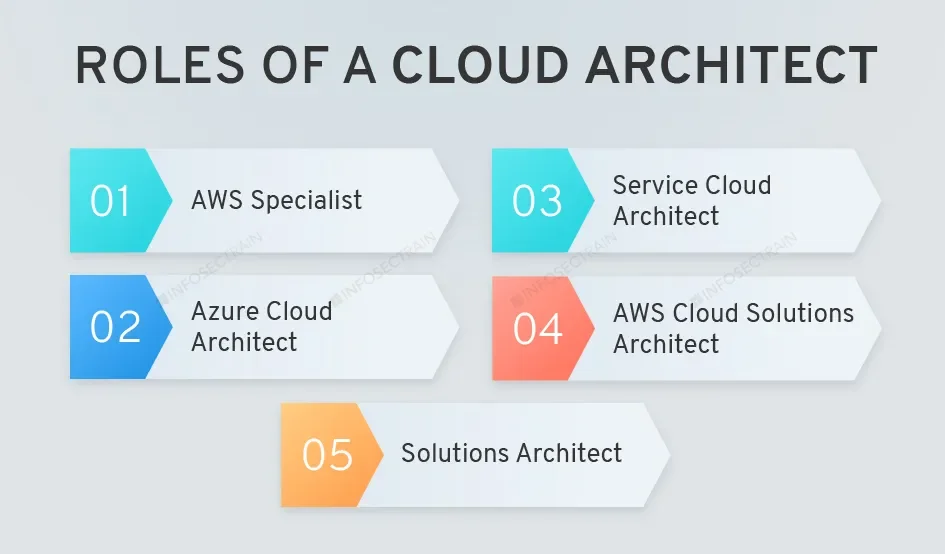
Cloud architects specialize in designing and managing cloud-based software systems. They are responsible for creating scalable and reliable cloud solutions that meet the needs of the organization. These are some skills that a cloud architect must possess:
- Experience with Infrastructure-as-Code (IaC) tools and configuration management tools
- Knowledge of containerization technologies such as Docker and container orchestration platforms such as Kubernetes
- Experience with cloud-based networking and security solutions, including virtual private clouds (VPCs), network ACLs, and security groups
- Expertise in designing and implementing cloud-based architectures, including cloud-native solutions, microservices, and serverless architectures
- Understanding of cloud-based monitoring, logging, and alerting solutions, and experience with tools such as Amazon CloudWatch, Azure Monitor, or Google Cloud Logging
Below are the job responsibilities of a cloud architect:
- Develop and maintain infrastructure-as-code (IaC) templates, using tools such as Terraform, CloudFormation, or ARM templates
- Develop and implement cloud-based monitoring and alerting solutions, using tools such as CloudWatch, Azure Monitor, or Google Stackdriver
- Ensure compliance with cloud security best practices and standards, and implement appropriate security controls to protect cloud-based assets and data
- Develop and implement cloud-based disaster recovery (DR) and business continuity (BC) plans to ensure the high availability and resilience of cloud-based systems and services
- Collaborate with DevOps teams to design and implement continuous integration/continuous delivery (CI/CD) pipelines and automated deployment workflows for cloud-based applications and services
Now for the moment we've all been waiting for. We will reveal the juicy details of what a software engineer can earn and how much you need to set aside to hire their expertise.
Software Engineer Salaries In 2024
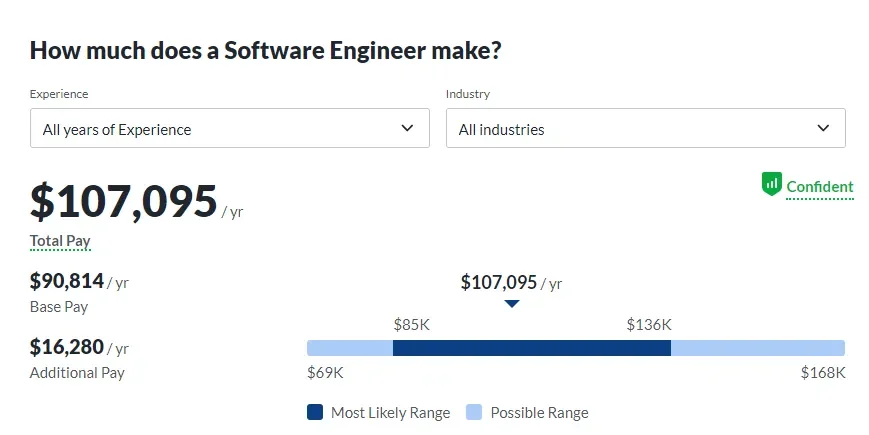
The industry that a software engineer works in is likely to impact their salary. Location is another important factor to consider when looking at software engineer salaries. On average, this is how much different software engineers make in a year:
- Software Engineer Salary: $107,095 /year
- Full-Stack Software Engineer Salary: $120,145/year
- Front-End Software Engineer Salary: $116,827/year
- Back-End Software Engineer Salary: $125,258/year
- Embedded Software Engineer Salary: $130,451/year
- Quality Assurance Software Engineer Salary: $88,334/year
- DevOps Engineer Salary: $134,332/year
- Data Engineer Salary: $115,339/year
- Software Architect Salary: $174,090/year
- Security Engineer Salary: $132,167/year
- Cloud Architect Salary: $200,471/year
Conclusion
There is no denying that software engineers are the backbone of the cyber world we live in today. They are responsible for building, maintaining, and improving the software that powers our daily lives.
The bottom line is that no industry can do without a skilled software engineer by their side. While it is true that tech firms hire most of the lot since their technical expertise and creativity are what drive innovation and progress in the tech industry, government organizations, healthcare, warehousing companies, and more are not far behind.
If your organization is looking to enhance and achieve better results, hiring an aptly skilled software engineer is what you need. At Aloa, we have a pool of the top global software engineering talent hired through a rigorous vetted process for your outsourcing development needs.
We guarantee consistent results and a more predictable outcome once you have onboarded our expert team of software engineers. So for the best optimization of your time, contact us today.

